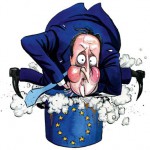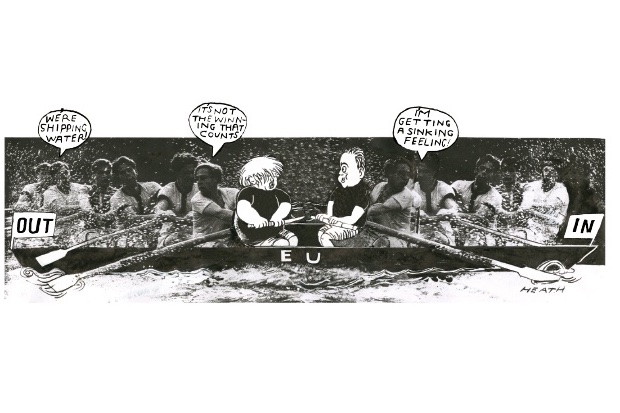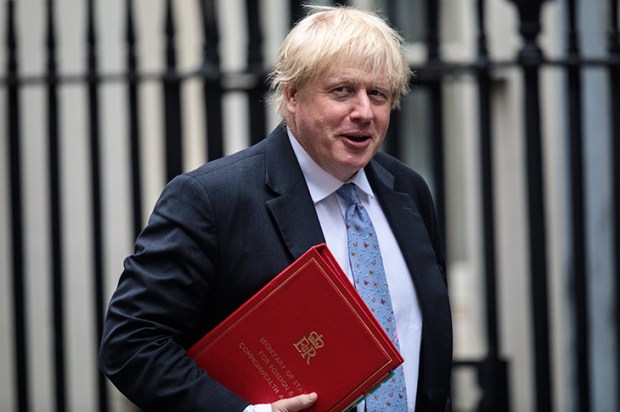Listen
If Downing Street’s calculations are correct, next week will see politics begin to return to normal. We’ll all move on from talking about Boris Johnson and Brexit and instead start fretting about the budget and pensions: the first phase of this four-month referendum campaign will be over. The two sides will regroup and try to work out what they can take from these initial skirmishes.
One lesson from the first weeks of the campaign is that the ‘in’ side have the advantage when the debate is on the economy. There are simply too many unanswered question and uncertainties for ‘out’. This is why the No. 10 barrage, which has taken ruthless advantage of its control of the government’s research and communications machine, has concentrated on this aspect of EU membership.
The economic argument also plays to Cameron and Osborne’s strengths. The election showed that voters trusted them with the economy, preferring the continuity they were offering to the change that Ed Miliband proposed. The ‘in’ campaign hopes that it can push economic security up the agenda and drive voters towards the reassuring figure of the Prime Minister. As one influential figure on the ‘in’ side puts it: ‘Our polling shows that the majority of peoples’ default position is that they want the economic benefits of staying in.’ There is, though, some concern on the ‘in’ campaign that it has not yet hit upon an economic issue with the resonance that the currency question had in the Scottish referendum.
However, when the focus has been on immigration, ‘out’ has had the better of things. Nothing in Cameron’s EU deal will significantly reduce immigration to Britain — there is, therefore, no chance of the Prime Minister fulfilling his aspiration to reduce net migration to under 100,000. Immigration has risen to 323,000 a year. This is particularly problematic for Cameron. A post-election poll by Lynton Crosby, the Australian political strategist who masterminded the Tories’ election victory, showed that the commitment to control immigration was the Tory policy that their voters remembered most.
Vote Leave is now pitch-perfect on the immigration issue. Their campaign stresses that they are not opposed to immigration but that Britain must have control over who comes into this country. As Chris Grayling put it to me when I interviewed him last week: ‘We absolutely have to have the ability to set limits on the number of people coming to work here. No one is saying that there will be no migration, but we need the ability to set limits. There is nothing in our current relationship, even post-renegotiation, with the European Union that allows us to do that.’
What alarms several influential figures who are working to keep Britain in the EU is how quickly voters can change their mind on the European question. Their great worry is that some incident could quickly shift opinion in favour of leaving. New footage of migrants breaking through border crossings, or Turkish threats to put migrants on buses to Europe underlines these concerns. If migration is the dominant issue in the run-up to the referendum, then ‘out’ could upset the odds and triumph.
At the moment, though, the ‘in’ camp remains the firm favourite. Cameron’s effort to highlight the risks of leaving might be crude, but it has been effective in framing the debate. This is why ‘out’ is now pushing the risks of staying in. Grayling warns that the EU is still heading in a direction that Britain does not want to go. ‘I have in my mind a map of the European Union in ten years’ time’, he tells me, ‘where if you colour the Eurozone blue and then see what’s left — you have a little area around the United Kingdom and you perhaps have Denmark. We end up being fringe players in a set of institutions which have completely different goals to us and I cannot see in that situation how our international interest remains on anybody’s agenda.’
These past few weeks have highlighted one dilemma that Cameron will have to resolve before the real campaign starts. Does he want to go all-out to win the referendum, or pull his punches in hope of reunifying his party afterwards? If he opts for the latter, he will have to make clear that he respects intellectually those arguing for Brexit. He will also need to avoid associating himself with some of the sillier arguments being pumped out by the pro-EU lobby. Carolyn McCall, chief executive of EasyJet, recently suggested that Brexit would mean the end of cheap air travel — a bizarre intervention that has gone down particularly badly with Tory MPs. When I asked Grayling about her, he said: ‘I would hope that none of us as senior Conservatives, senior members of the government, would put across views that are patently absurd.’
But the bigger challenge facing the ‘out’ campaign is how to find a way of making a vote to leave look like less of a risk. I understand that senior Conservative ‘outers’ are considering a declaration during the campaign that they would support a referendum on the terms of the exit deal.
The thinking behind this is that it would reassure the public that if the deal being offered were truly dire, they would have the chance to say no. But it is not quite clear what would happen if the terms of exit were given the thumbs down by the voters. For if Article 50 — the legal process by which a state can leave the European Union — were to be invoked, Britain’s previous status would not be available. This, perhaps, explains why some on the ‘out’ side are so quick to point out that Article 50 would not have to be invoked immediately in the event of a vote to leave.
As always in campaigns, events will dictate what happens. News that you wouldn’t have thought political will suddenly become part of the debate about the role of the EU—for good or ill—in our national life. The challenge for the two campaigns will be to be adapt to a rapidly changing environment.
 Join The Spectator for an evening debate chaired by Andrew Neil:
Join The Spectator for an evening debate chaired by Andrew Neil:
Should Britain leave the EU?
26 April 2016 | London Palladium, Argyll Street, W1F 7TF
Book now
Got something to add? Join the discussion and comment below.
Get 10 issues for just $10
Subscribe to The Spectator Australia today for the next 10 magazine issues, plus full online access, for just $10.
















Comments
Don't miss out
Join the conversation with other Spectator Australia readers. Subscribe to leave a comment.
SUBSCRIBEAlready a subscriber? Log in